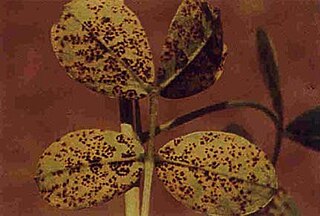
Rusts are plant diseases caused by pathogenic fungi of the order Pucciniales.
Puccinia cacabata is a plant pathogen that causes rust on cotton.
Puccinia striiformis is a plant pathogen. It causes stripe rust on wheat, but has other hosts as well. The species is common in Europe and in more recent years has become a problem in Australia. Infection can cause losses of up to 40%, and the fungus will infect both winter wheat and spring wheat.

Puccinia arachidis, or peanut rust, is a plant pathogen that causes rust on peanut. Its spread is promoted by warm, damp weather.
Puccinia campanulae is a plant pathogen that causes rust on bellflower (Campanula).
Puccinia carthami is a plant pathogen that causes rust on safflower.

Puccinia dioicae is a plant pathogen that causes rust on goldenrod.

Puccinia menthae is a fungal plant pathogen that causes rust on mint plants.

Puccinia pelargonii-zonalis is a plant pathogen that causes rust on Pelargonium geraniums.

Puccinia purpurea is a plant pathogen that causes rust on sorghum. P. purpurea is native to eastern Australia except Queensland. The pathogen was discovered in 1876 by Cooke. In Australia, it is considered a pest.
Puccinia subnitens is a plant pathogen that causes rust on Beta vulgaris.
Puccinia verruca is a plant pathogen that causes rust on safflower.

Puccinia recondita is a fungus species belonging to the order of Pucciniales and family Pucciniaceae.
Puccinia erianthi is a species of fungus and a plant pathogen. It was originally found on the leaves of Erianthus fulvus in Punjab, India. It is a common cause of sugarcane rust.
Puccinia pittieriana is a species of rust fungus. It is a plant pathogen which infects agricultural crops such as potato and tomato. Its common names include common potato rust and common potato and tomato rust.

Puccinia monoica is a parasitic rust fungus of the genus Puccinia that inhibits flowering in its host plant and radically transforms host morphology in order to facilitate its own sexual reproduction.

Puccinia jaceae var. solstitialis is a species of fungus in the Pucciniaceae family. It is a plant pathogen that causes rust. Native to Eurasia, it is the first fungal pathogen approved in the United States as a biological control agent to curb the growth of the invasive weed yellow starthistle.
P. linearis may refer to:

Puccinia poarum, the coltsfoot gall rust or meadow grass rust, is a plant pathogen. This fungal parasite forms a yellow to orange gall, 1–2 cm in diameter, on the underside of leaves of coltsfoot. It also infects, but does not gall grasses of the family Poaceae. P. poarum is a genetically diverse species that has been reported on at least seventy plant hosts.

Puccinia sessilis is a fungal plant pathogen, also known as arum rust or ramsons rust. It commonly infects Arum maculatum and Allium ursinum causing yellow to orange circular patches on leaves. On the underside it produces raised orange aecia commonly covered in spores. It is common in Eurasia in the spring.










